Loai Deeb and a $534,000 villa in Amman
GNRD chief 'asked if Jordan enforces money-laundering laws'
17 July 2015: Loai Deeb, founder-president of the Global Network for Rights and Development (GNRD), asked the deputy head of his Jordan office to find out about Jordanian money-laundering laws and whether they are enforced or not, the Norwegian broadcaster NRK reports.
GNRD, one of the world's strangest human rights organisations, is based in Norway but appears to receive most of its funds via the United Arab Emirates. Last May, Norwegian police raided its offices in Stavanger, along with Deeb's home, as part of a $13 million money-laundering investigation.
Before founding GNRD in 2008, Deeb – a Norwegian citizen of Palestinian origin – earned a living distributing newspapers and as an airport security guard, according to media reports. In 2007, he also started running a fake university from his home but it closed three years later under threat of prosecution. Deeb himself claims to have a doctorate in international law but has given conflicting accounts of where he obtained the degree.
In 2013, Deeb's personal income – which had been around $25,000 a year until 2012 – suddenly leapt to $600,000, raising questions about where the money was coming from.
Deeb is reported to have set up several new companies in Norway recently (some of which include other GNRD figures on their boards) and has also been acquiring property.
According to Stavanger Aftenblad, he bought two properties in Norway last year for a total of 12.3 million kroner ($1.6 million) and paid for them in full without taking out a loan. But it now appears Deeb's property purchases were not confined to Norway. He has also bought houses in Cairo and a villa in the Jordanian capital, Amman, according to NRK.
Deeb bought the Jordanian villa, covering 738 square meters, for 380,000 dinars ($534,000) and, again, he paid the full amount without taking out a loan, NRK says.
NRK says it was shown the villa by Naema Onizat, the former deputy chief of GNRD's Amman office who was asked by Deeb to enquire about Jordanian money-laundering laws and their enforcement. Onizat told NRK he left GNRD after becoming suspicious about Deeb's activities.
Asked by NRK about the property purchases, Deeb's lawyer, Kjell Brygfjeld, declined to comment. He told the broadcaster: "We will return to all questions when we become aware of the factual basis for the charges against Deeb."
 |
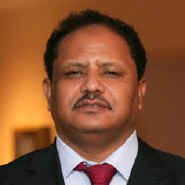 |
Same man, two names
A puzzling tale of Sudan and GNRD's vice-president
18 July 2015: Following the revelation that it is at the centre of a $13 million money-laundering investigation by Norwegian police, the Global Network for Rights and Development (GNRD) has been eager to create the impression that human rights activists around the world are rallying to its support. A headline on GNRD's website, for example, proclaims that "the non-governmental organisations community" is "shocked by the unexpected behavior of the Norwegian government towards GNRD".
This claim might be a little more credible if the organisations expressing their "shock" were not so closely connected with GNRD. Two of its most vociferous supporters are the Swiss-based International Institute for Peace Justice and Human Rights (IIPJHR) and Maat for Peace Development and Human Rights (an Egyptian organisation which appears to support the Sisi regime). IIPJR and Maat worked jointly with GNRD as observers for the presidential election in Egypt last year and are scheduled to do so again when parliamentary elections are held.
The relationship between GNRD and IIPJHR is especially close. A look at the press releases on IIPJHR's website shows most of its activities are carried out in conjunction with GNRD. IIPJHR's office address in Geneva is 1 Rue Richard Wagner, which – by a remarkable coincidence – is also the address of GNRD's Geneva office.
Sudanese connections
Another leading supporter of GNRD is Maarij Foundation for Peace and Development, a Sudanese organisation.
Speaking in the UN Human Rights Council last month, a representative from Maarij denounced the police raids on GNRD's headquarters and the home of its founder-president, Loai Deeb. "Such actions against a human rights organisation can be expected in a country with a totalitarian regime, but not in a country with a strong democracy," he said, adding that "GNRD activities are always met with high appreciation around the globe".
Maarij and GNRD have previously held joint events on the subject of Sudan. Last September, for example, at a meeting on the sidelines of the Human Rights Council, they jointly called for the United States to end its sanctions against Sudan.
Maarij has previously shown sympathy for the Sudanese government, and the Sudanese government has also shown sympathy for GNRD.
In 2011, when Sudan came up for scrutiny under the Human Rights Council's "universal periodic review" system, Maarij submitted a largely uncritical report praising "reforms" by the Sudanese government.
Last February, when the UN decided to grant GNRD consultative status (under controversial circumstances), the Sudanese government's representative spoke strongly in GNRD's support. According to an official account of the meeting (page 21):
"The representative of the Sudan recalled that the organisation [GNRD] had been under review since 2011 and highlighted the excellent work of the organisation, adding that it was registered in Norway, Switzerland and Belgium and had cooperated fully with local authorities."
An intriguing sidelight on Maarij and GNRD is that both have Emirati connections. GNRD appears to receive most of its funding via the UAE, though it denies the money comes from government sources. Deeb, its founder-president, has family and business connections there, too. The extent of Maarij's Emirati connections is unclear but it is on record (in Arabic) as having received support from a charity run by Sheikh Mohammed bin Rashid Al Maktoum, the ruler of Dubai.
But there's another, much more intimate, connection between Maarij and GNRD – and one which neither organisation seems eager to draw attention to.
Double identity
On bayt.com, a professional networking website popular with Arabs, there's a profile in the name of Abozer Mohamed, and it describes him as the Humanitarian Affairs Director of Maarij. The accompanying photograph of Abozer Mohamed bears a strong resemblance to Abozer Elmana Elligai, vice-president of GNRD.
In fact, Abozer Mohamed of Maarij and Abozer Elmana Elligai of GNRD are the same person under two different names. His full name, as indicated by another website, appears to be Abozer Elmana Mohamed Elligai.
However, there was no mention of Maarij (or, indeed, Sudan) in the biographical note about GNRD's vice-president posted on GNRD's website. It simply said:
Mr. Abozer Elmana Elligai
GNRD Vice-PresidentMore than 20 years of experience in NGOs work and cooperation with United Nations. Main GNRD representative at UN Offices in New York and Vienna; at Human Rights Council Sessions in Geneva. Consultant at AUC in Human Rights Field.
This biographical note was deleted, along with those of other GNRD staff, shortly after Norwegian media began taking an interest in the organisation's affairs but is preserved in the Wayback Machine's archive.
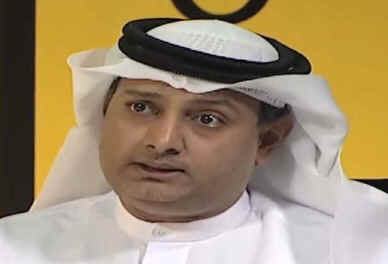
Source of GNRD's funding revealed
Further connections with Dahlan and Scientologists
18 August, 2015: The Global Network for Rights and Development (GNRD) is a strange human rights organisation based in Norway and founded by a man who once ran a fake university. I have been investigating its activities and blogging about them for almost a year, so readers unfamiliar with the story may wish to start here.
GNRD has connections with the United Arab Emirates and has long been suspected of being an Emirati front organisation.
Last May, Norwegian police raided GNRD's offices and the home of its founder, Loai Deeb, as part of a $13 million money-laundering investigation. Most of that money is alleged to have arrived in Norway last year, via the UAE.
GNRD, which denies any wrongdoing, has never disclosed its sources of funding but now, thanks to a document which has come into my possession, one of its Emirati funders can be positively identified.
The document shows a bank transfer, in August 2013, of 100,000 euros to GNRD from al-Mezmaah Studies and Research Center in Dubai. It is understood that this was not the only payment from al-Mezmaah to GNRD and that al-Mezmaah is GNRD's main point of contact in the UAE.
Click to enlarge" src="/sites/default/files/grnd-mezmaah2.png" style="border-style:solid; border-width:1px; height:282px; width:200px" />
Al-Mezmaah describes itself as "an independent centre established by Dr Salem Humaid with the aim of concentrating on the regional affairs of the United Arab Emirates and also its repercussion at the Arab and international level and all that which exalt the name of the United Arab Emirates".
The website goes on to explain the choice of "mezmaah" for its name:
"It means the basket made from the woven palm leaves, and molded in the form of spiral in order to be in the form of a basket which is used by the sea and land people working in different fields and the fishermen used it to carry precious shells and pearls which they hunted from the sea after a severe effort at a time when the pearl trade was the economic nerve of many UAE cities.
"Al Mezmaah is the Emirate symbol of a basket with which we carry what is beneficial to us from information, news, studies and opinions that are being chosen carefully for you ..."
Al-Mezmaah engages in a wide range of activities but has been especially active campaigning against the Muslim Brotherhood and Iran, as can be seen from the articles on its website.

In 2013 al-Mezmaah published a book about Egypt entitled Suqut al-Ikhwan ("The Fall of the Brotherhood") and last year announced the launch of a free monthly magazine "to raise awareness of the dangers of political Islam". It said the magazine, Sada al-Watan ("Echo of the Nation") would be included as a free supplement with two Emirati newspapers and also "distributed in public places".
Involvement with Mohammed Dahlan
Al-Mezmaah also has connections with Mohammed Dahlan, the former head of Palestinian "preventive security" in Gaza. Dahlan now lives in the UAE where he is reported to be working as a security adviser for Mohammed bin Zayed, the crown prince of Abu Dhabi.
An article by al-Mezmaah in 2013 praised Dahlan for his views on the Muslim Brotherhood:
"Perhaps the lesson or strong blow leveled by Palestine leader Muhammed Dahlan ... against the group recently is a best evidence that uncovered nakedness of this group and its allies and plotters against the Arab people.
"Dahlan is not an ordinary man but is a professional security official and he knows more about the secrets of the international organization of Muslim Brotherhood and its offshoot in Gaza the Hamas and he possesses many documents that make this group naked before the Arab People.
"He asserted that [the] Brotherhood maintains firm security contacts with Israel that surpassed during the days of regime of former president of Egypt, and the ceasefire agreement in Gaza under the patronage of Brotherhood, is tantamount to a bare and deceit agreement and it portrayed the activities of Palestine Resistance as hostile activities and the US Ambassador in Egypt Anne W Patterson is the General Advisor of Brotherhood Group."
In April last year a Qatari website, Alamat Online, accused Dahlan of planning a media campaign to sabotage relations between Qatar and Saudi Arabia. It claimed the Saudis had intercepted communications between the crown prince's office and Dahlan, revealing a plan to commission inflammatory articles from al-Mezmaah for publication on various Arabic websites and in Egyptian newspapers. An English version of the story can be found on the Middle East Monitor website.
Dahlan has also been alleged to be involved in funding GNRD. In February this year, GNRD held a hugely expensive conference on counter-terrorism in Geneva and according to a French-language publication, Afrique Asie, it was financed mainly by a group of businessmen who included Mohammed Dahlan.

Humaid's Scientology connection
Salem Humaid, the founder of al-Mezmaah, has held various government posts in Dubai – most notably with the Dubai Culture and Arts Authority. He has also written occasionally for the Emirati newspaper, The National. One of his articles for The National attacked Human Rights Watch, suggesting it was "little more than a mouthpiece for the Muslim Brotherhood's international organisation".
Aside from his campaigning against the Brotherhood, Humaid holds a very unusual distinction. In 2010, he became the first Arab ever to be named "Culture Person of the Year" by the Church of Scientology. The title was bestowed on him at the Scientologists' "Writers of the Future" awards ceremony in Hollywood. A report of this event also said Humaid had been chosen to "supervise the Arabisation" of books by Scientology's founder, L Ron Hubbard.

According to a Scientology website, the Dubai Culture and Arts Authority has also presented an award to the Scientologists "in recognition of Mr Hubbard’s vision of a world where arts and the artist may flourish".
This connection may help to explain GNRD's bizarre involvement with Scientologists. Earlier this year, GRND staff attended "human rights training workshops" in London under the auspices of Youth for Human Rights, a Scientology front organisation. GNRD staff also attended a Scientology-run event to mark International Women's Day. The activities were reported on GNRD's website but without mentioning the word "Scientology".
Move to expel Norwegian TV from Egypt
GNRD's ally seeks reprisal over accusations
19 August 2015: An Egyptian human rights organisation has filed a lawsuit which seeks to have the Norwegian state broadcaster, NRK, banned from reporting in Egypt.
The legal move was initiated by Maat for Peace, Development and Human Rights, an Egyptian ally of the Global Network for Rights and Development (GNRD), a quasi-NGO which is based in Norway and funded from the United Arab Emirates.
GNRD and its founder, Loai Deeb, are currently the subject of a $13 million money-laundering investigation by the Norwegian authorities (see previous blog posts). Maat's action is clearly intended as a reprisal against Norway.
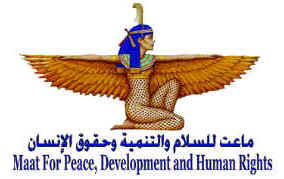
The money-laundering investigation is believed to have started when large transfers of money from the UAE to GNRD (and Deeb personally) triggered alarms in the banking system but GNRD has been attempting to politicise the affair, claiming that Norway is acting under pressure from Qatar and that police raids on its offices and Deeb's home last May were an abuse of human rights.
Referring to Maat's lawsuit in Egypt, an announcement on GNRD's website says:
"The human rights organisation [i.e. Maat] in its lawsuit (ref /71184) called on both the head of the General Authority of Information and the Director of the Foreign Correspondents Center to cancel the licence granted to the Norwegian state television team.
"Maat pointed out that, on 17 June this year, it issued with 173 Egyptian civil society statement of solidarity with Global Network for Rights and Development (GNRD), which suffered unjustified violations by the Norwegian police and earlier faced a campaign of systematic attacks, orchestrated by an Arab country hostile to the organisation, as a result of its criticism of the human rights record of the concerned country.
"The Egyptian human rights organisation added, 'The coverage of the Norwegian state television reporter was lacking neutrality, and based on fabricated lies, in contrasts with the work ethics of the media'."
Maat and GNRD worked together last year as observers of the presidential election in Egypt which legitimised Sisi's seizure of power. They later produced an enthusiastic report hailing the election as "a unique process toward democratic transition". A senior member of GNRD's observer team was Anne-Marie Lizin, a disgraced Belgian politician with a conviction for electoral malpractice.
GNRD, Maat and another GNRD ally – the Swiss-based
International Institute for Peace, Justice and Human Rights (IIPJHR) – have since been approved by the Sisi regime to observe Egypt's forthcoming (but long delayed) parliamentary elections.
In a statement yesterday to MENA, the Egyptian government's news agency, GNRD chief Loai Deeb described Sisi's election as "one of the greatest epics of democratic transition in the world" and said that the alliance of organisations monitoring the parliamentary elections would be "the largest mission in the history of Africa", with 7,000 local and international observers.
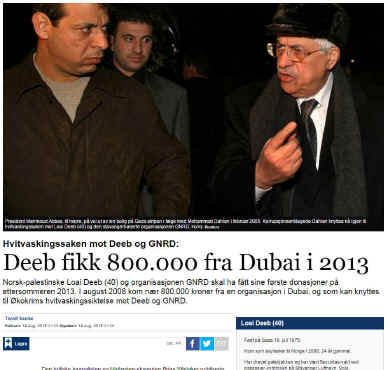
UAE payment to suspect rights group confirmed
But what was the money for?
20 August 2015: A Norwegian newspaper has independently confirmed the authenticity of a document published by al-bab on Tuesday showing an Emirati payment of 100,000 euros to GNRD, the human rights organisation suspected of money-laundering.
A report in Stavanger Aftenbladet (subscription) says the newspaper has established "from other sources" that the document is genuine.
It shows that on 30 August 2013, al-Mezmaah Studies and Research Center in Dubai transferred the money to GNRD (the Global Network for Rights and Development) which has its headquarters in Norway. Al-Mezmaah has connections with both the Emirati government and Mohammed Dahlan, the former head of Palestinian "preventive security" in Gaza.
Click to enlarge" src="/sites/default/files/grnd-mezmaah2.png" style="border-style:solid; border-width:1px; height:282px; width:200px" />
According to Aftenbladet, this was the first Emirati payment received by GNRD, or one of the first. It is also said to be the only direct payment from al-Mezmaah. This was followed by "a significant number of transfers from various senders in the United Arab Emirates to GNRD," Aftenbladet says, adding that the flow of money from GNRD and out of Norway was also "extensive". According to Norwegian police, the total amount under investigation is around $13 million.
It was the nature of these transactions that first aroused suspicion with the Norwegian authorities, triggering a police investigation and raids last May on GNRD's offices and the home of its founder-president, Loai Deeb. GNRD and Deeb deny money-laundering and blame the government of Qatar for the allegations against them.
One question raised by al-Mezmaah's payment is what it was for. Was it for general use or for some specific purpose? If it was the latter, GNRD's activity report for 2013 indicates several possibilities, but these are purely speculative suggestions.
It might, for example, have been a payment for the International Human Rights Rank Indicator which GNRD published some six weeks later. GNRD described this as "the most trustful and complete" indicator of human rights across 216 countries and – very surprisingly, it placed the UAE in twelfth position worldwide, between New Zealand and Iceland. The survey was widely ridiculed on social media and GNRD eventually deleted it from the internet, though an archived copy can be found here.
However, it is worth noting that al-Mezmaah's payment was made in euros rather than Norwegian kroner. This suggests the money was not a contribution to GNRD's expenses in Norway but had been earmarked for use somewhere within the EU's euro zone.
GNRD's published financial statement for the year to 31 December 2013 shows it was using three accounts. One of these, described as its "European account", may have been denominated in euros. It had a balance equivalent to eight million kroner (880,000 euros) at the end of the year.
The 100,000 euros from al-Mezmaah could have been intended either for general use within the euro zone or for a specific purpose. One possibility is that it was for a new office in Spain, which GNRD said it was in the process of opening. Another is that it was to fund a conference on Syria which GNRD held in Brussels on 12 September 2013 – a couple of weeks after al-Mezmaah's payment.
The Brussels conference, entitled "Against Dictatorship and Foreign Intervention in Syria", was organised by GNRD "in cooperation" with the "Alliance of Civil and Political Forces against Dictatorship and Foreign Intervention in Syria". GNRD's report of the conference has since been deleted from its website and no archived copy is available. However, a series of videos from the conference can still be found on YouTube and there's also an account of it on a Kurdish website.
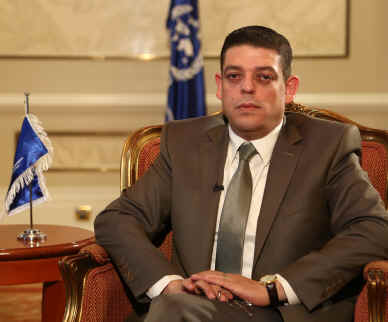
UAE's cut-and-paste consulting firm
Plagiarism raises questions about Deeb's company
21 August 2015: Deeb Consulting FZF is a company based in the tax-free zone of Ras al-Khaimah in the United Arab Emirates. Its sole proprietor is Loai Deeb who formerly ran a fake university from his home in Norway and is currently president of GNRD, a human rights organisation which Norwegian police are investigating on suspicion of money-laundering.
Deeb Consulting used to be the first of five companies listed by GNRD as its sponsors, though their names were removed shortly after news of the police investigation became public. According to Norwegian media, Deeb Consulting provided funds to GNRD and the relationship between the two forms a central part of the money-laundering investigation.
Given Deeb's history with his bogus "Scandinavian University", it's probably not unreasonable to ask whether Deeb Consulting is a real business and whether it actually knows anything about consulting.
A look at its website suggests, at the very least, that Deeb Consulting has a severe lack of original ideas. A section describing the services on offer begins:
"Unstable market conditions can be rather frustrating. Deeb Consulting FZF works with heads of the companies and their management teams to address growth challenges as opportunities, including guidance for Market Expansion strategy, product Diversification strategy and New Product Strategy development requirements or launches – all critical components to your business growth strategy."
This is remarkably similar to a paragraph on the website of another consulting firm, Chief Outsiders, based in Houston, Texas:
"Slow growth or a declining market can be quite frustrating. Chief Outsiders works with CEOs and their management teams to address growth challenges as opportunities, including brand strategy consulting, planning and operational guidance for a new market expansion strategy, new product development requirements or launch planning, as well as product diversification strategies — all critical components to your business growth strategy."
Deeb Consulting continues:
"One of the main challenge[s] of the promotional investment is the calculation of its effectiveness. Thus, we work hard to provide our clients with it. We offer visibility into the Return on Marketing Investment, and work on Brand Strategy and Pricing Complexity. We make our clients address potential Channel Conflict in their routes to market. By tapping market insights to increase relevance while assuring the most effective plans for execution, their promotional activities will result is a greater level of precision, and as a result greater efficiency."
And Chief Outsiders continues:
"Perhaps the most urgent requests we receive from CEOs relate to the effectiveness of their promotional investment as they implement their go-to-market strategy. They often lack reasonable visibility into the return on marketing investment. Or even before going to market, they may face challenges including poor brand strategy, pricing complexity or have not addressed potential channel conflict in their routes to market. By tapping market insights to increase relevance while assuring the most effective plans for execution, their promotional activities will result is a greater level of precision, and as a result greater efficiency."
Note the last sentence in these two paragraphs. The mistake, "will result is", instead of "will result in", occurs in both Chief Outsiders' version and Deeb's version.
This is followed by several sentences plagiarised from the website of Point B, another consulting firm:
Deeb Consulting: "We find best solutions for the clients to design the right structures and elevating team performance."
Point B: "We help clients improve the effectiveness of their organizations by designing the right structures and elevating team performance."
Deeb Consulting: "We help clients develop and deploy HR and talent strategies that align with their overall business objectives, workforce trends, and company culture."
Point B: "Point B helps clients develop and deploy HR and talent strategies that align with their overall business objectives, workforce trends, and company culture."
Deeb Consulting: "We work with client executives, individually and in groups, to improve their leadership capabilities and increase their impact in the organization."
Point B: "We work with client executives, individually and in groups, to improve their leadership capabilities and increase their impact in the organization."
Deeb Consulting then has some sentences which are almost identical those on the website of yet another firm, Alix Partners:
Deeb Consulting: "Our IT experts help companies use their information effectively, quickly, and at lower cost while realizing greater value."
Alix Partners: "Our IT and Applied Analytics experts specialize in helping companies use their information effectively, quickly, and at lower cost while realizing greater value."
Deeb Consulting: "To help a company extract valuable meaning from big data, our Applied Analytics experts develop fast, affordable, and customized analytical solutions that deliver real-time insights into the company’s business and that drive maximum performance."
Alix Partners: "To help a company extract valuable meaning from big data, our Applied Analytics experts develop fast, affordable, and customized analytical solutions that deliver real-time insights into the company’s business and that drive maximum performance."
A check via the Wayback internet archive shows that the words quoted from Point B's website have been there since June 2012, and possibly earlier. Deeb Consulting's website was not registered until February 2014, so there's no real doubt about who copied whom. It has not been possible to date the relevant web pages of Chief Outsiders and Alix Partners.
Deeb and GNRD deny money-laundering and blame the government of Qatar for the allegations against them.
Legal moves in money-laundering case
GNRD seeks access to documents
25 August 2015: GNRD, the Emirati-funded human rights organisation suspected of money-laundering, and Loai Deeb, its founder/president, went to court in Norway yesterday seeking information about the evidence against them.
They requested access to documents held by Økokrim, Norway's economic crimes unit, which raided GNRD's Stavanger headquarters along with Deeb's home on 27 May in what was said to be a $13 million money-laundering investigation.
A report in Stavanger Aftenblad says yesterday's court hearing took place mostly behind closed doors. The judge accepted Økokrim's argument that an open hearing could harm the police investigation which was said to be still in its early stages and involving several countries. There was also a possibility that spectators at the hearing could later become witnesses in the case.
Aftenbladet says there were 11 members of the public in court before it went into closed session – mostly senior figures from GNRD.
Mystery lawyers from London
There were also two people who later identified themselves as lawyers from London. When asked about their involvement in the case, one of them told Aftenbladet they had come at their own expense: "We have always wanted to come to Norway. It is a beautiful country and the streets are so clean. It's not like in London." However, the paper adds that according to Deeb's lawyer, Kjell Brygfjeld, GNRD has previously worked with the two London lawyers.
Aftenbladet quotes Brygfjeld as complaining that Deeb is "being kept in the dark with regard to the factual basis for why he has been charged in this case".
Deeb and Brygfjeld have known each other for some years. In 2009 they were both involved in legal moves to prosecute several Israeli politicians and military figures for war crimes. Last year, Brygfjeld was one of three Norwegian lawyers sent by GNRD on an unsuccessful fact-finding mission to the Kurdish region of Syria.
"No connection" with Dahlan
Brygfjeld also told Aftenbladet that contrary to previous reports Deeb has "no connection" with Mohammed Dahlan, the former head of Palestinian "preventive security" in Gaza who now lives in the UAE. Brygfjeld said Deeb's relations with Dahlan are "not amicable" but he has "good contact" with the Palestinian president, Mahmoud Abbas.
Aftenbladet adds that outside the courtroom its reporter, Toralf Sandø, was approached by Deeb who told him much of what the paper had published about the GNRD affair was wrong – though he declined to elaborate. Deeb has given no media interviews since news emerged of the police raids.
Deeb and GNRD deny money-laundering and blame the government of Qatar for the allegations against them.
Deeb, who claims that Norwegian investigators have violated his human rights, has recently posted a series of statements on Twitter in Arabic, French and English. One says:
"Enjoying fair justice is one of the strongest keys for a good government. Unfair justice is the first step towards the collapse of any government."
Another says:
"When they violate your rights think plan and know how to respond because anger make you lose control."
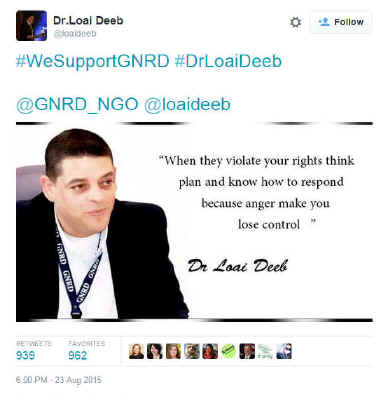
Bribery claim in GNRD 'money-laundering' case
Mystery websites smear Norwegian prosecutor
4 September 2015: Two anonymously-registered websites – one in English, the other in Arabic – are circulating wild claims about the police investigation into GNRD, the Emirati-funded human rights organisation based in Norway.
The Stavanger headquarters of GNRD (the Global Network for Rights and Development) and the home of its founder-president Loai Deeb were raided by Økokrim [Norway's economic crime unit] last May on suspicion of money-laundering. The investigation appears to have been triggered by large transfers of money from the UAE through the Norwegian banking system.
GNRD and Deeb deny money-laundering and blame the government of Qatar for the allegations against them. However, a website called Norway Go Right goes further and accuses the prosecutor in the case of receiving millions of dollars in bribes:
"Sources say that the Norwegian prosecutor Havard Kampen had received bribes in millions of dollars in order to crack down on the network [GNRD] and to fabricate accusations against the NGO."
The website does not identify its sources and provides no evidence to suggest that the bribery claim is worth taking seriously.
Norway Go Right was registered anonymously on July 18 in the American state of Utah. Its bribery claim is copied from an article posted on Twitt-Book, an Arabic-language website which attributes the story to an unnamed "reliable source". Twitt-Book was registered anonymously in the US in February 2014 and, judging by its other content, it seems to have connections with secular elements in the Syrian opposition.
A further item, added to the Norway Go Right website on Wednesday, extends the bribery claim to include multiple (but unnamed) Norwegian officials and increases the amount of money from millions of dollars to "tens of millions" – supposedly paid through "Qatari intelligence officers". As before, it provides no evidence to support these allegations.
It goes on to say:
"Sources confirm that much of the intelligence services in Europe have refused to cooperate with Norway in the destruction of GNRD, and advised the Norwegian intelligence not to get involved with Qatar in the attacks."
The headline suggests the Norwegian government is "in danger of falling apart" as a result of the GNRD affair.
This, again, is based on an Arabic article on the Twitt-Book website. Twitt-Book's version also seeks to implicate Azmi Bishara, a Palestinian politician now living in Qatar, in the attacks on GNRD.
Meanwhile, GNRD itself has issued a nine-minute promotional video under the title "Glorious Achievement of GNRD".
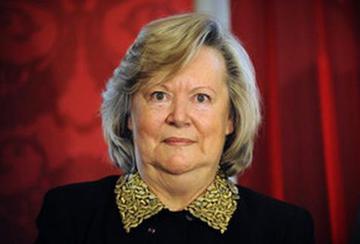
Rights activist defends Azerbaijan
GNRD 'high commissioner' accuses European Parliament
23 September 2016: A senior figure in the Global Network for Rights and Development (GNRD) has come to the defence of Azerbaijan following criticisms of its human rights record by the European Parliament.
Azerbaijan, a former Soviet republic, is a member of the Council of Europe and receives aid under the European Neighbourhood Policy. As a member of the European Broadcasting Union it hosted the Eurovision Song Contest in 2012.
Azerbaijan is also notorious for human rights abuses and a couple of weeks ago the European Parliament passed a resolution detailing some of its more recent violations.
"The overall human rights situation in Azerbaijan has deteriorated continuously over the last few years," the resolution said, "with growing intimidation and repression and intensification of the practice of criminal prosecution of NGO leaders, human rights defenders, journalists and other civil society representatives."
This resolution has since prompted objections from Anne-Marie Lizin, the discredited Belgian politician who serves as "High Commissioner" of GNRD, a quasi-NGO funded almost entirely via the United Arab Emirates and which is currently being investigated by Norwegian authorities on suspicion of money-laundering.
According to media reports from Azerbaijan, Ms Lizin – who has a conviction for electoral malpractice in Belgium – sent a protest letter to Martin Schulz, chair of the European Parliament complaining that the resolution was "neither constructive, nor fair" and calling for closer ties between the EU and Azerbaijan.
A similar thing happened last year when an earlier European Parliament resolution on the persecution of human rights defenders in Azerbaijan was followed by an article on GNRD's website praising Azerbaijan as "a unique country" which has "introduced many positive initiatives for women's rights and gender equality in the span of only a few years". It added:
"The remarkable efforts of Azerbaijan, the only Muslim country in the Eastern neighbourhood, should be recognised and encouraged by the EU."
These claims were the result of a "fact-finding mission" to Azerbaijan by Ms Lizin, accompanied by Patricia Lalonde (who, like Lizin, is a member of GNRD's women's committee) and Reine Marcelis, described as a "Belgian expert". It is unclear who paid for their trip, though their detailed report was published by La Ligue du Droit International des Femmes, a French organisation founded by the late feminist/existentialist Simone de Beauvoir.
Last year, despite her conviction for electoral malpractice, Lizin played a senior role in a GNRD observer mission for the presidential election in Egypt which legitimised General Sisi's seizure of power. The mission produced an enthusiastic report and GNRD has since been appointed by the Egyptian government to take part in monitoring the forthcoming parliamentary elections.
During a more recent visit to Cairo, Lizin was introduced to the Egyptian dictator and seems to have been so thrilled by the handshake that she posted a photo of it on her website:
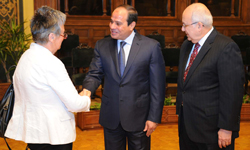
Sentence on GNRD 'commissioner' confirmed
Lizin loses appeal over electoral malpractice
2 October 2015: Belgium's supreme court has rejected an appeal by veteran politician Anne-Marie Lizin against her conviction for electoral malpractice. This probably signals the end of her political career in Belgium, though she still has an active globe-trotting role as "High Commissioner" of GNRD, the Emirates-funded quasi-NGO which Norwegian authorities have accused of money-laundering.
Lizin, who served three years as president of the Belgian senate and is currently its honorary president, has been fighting an eight-year legal battle against a suspended prison sentence and a five-year ban on holding public office.
The case relates to her time as mayor in the historic town of Huy – and the use of municipal employees (who are supposed to be politically neutral) for distributing election literature on her behalf. The arrangement was that employees who canvassed for Lizin during working hours would not have any pay deducted or be required to make up the lost time. This meant the municipality, in effect, would be subsidising Lizin's election campaign.
The scandal led to Lizin resigning acrimoniously after 26 years as Huy's mayor. She subsequently became involved in a road rage incident over Town Hall parking spaces between her own car and that of the woman who replaced her as mayor (reports
here and here).
Belgian media also reported that after leaving office Lizin had
retained a mobile phone provided by the municipality. This only came to light when the municipality received a 5,000 euros bill which Lizin reportedly agreed to pay after being threatened with legal action.
Despite her conviction for electoral malpractice, in her GNRD capacity Lizin played a key role in an observer mission for last year's presidential election in Egypt which legitimised General Sisi's seizure of power. The mission produced an enthusiastic report which commended the regime's "achievements thus far towards a path to democracy".
Lizin later met Sisi in person and seems to have been so thrilled that she posted a photo of their handshake on her website.

In a further controversy last month, she made a formal complaint to the European Parliament after it passed a resolution criticising human rights abuses in Azerbaijan.
She had previously co-authored an article on GNRD's website praising Azerbaijan as "a unique country" which has "introduced many positive initiatives for women's rights and gender equality in the span of only a few years". It added:
"The remarkable efforts of Azerbaijan, the only Muslim country in the Eastern neighbourhood, should be recognised and encouraged by the EU."
This week's court decision means Lizin has now exhausted all avenues for appeal within the Belgian legal system, though she immediately announced that she intends to take her case to the European Court of Human Rights, claiming to be the victim of "a terrible injustice, the result of false testimony". However, she has now formally resigned as a municipal councillor in Huy.
-
UPDATE: Anne-Marie Lizin died on 17 October 2015 after a short illness.
Warning to GNRD donors
UAE-linked rights group placed on fundraising watch list
4 October 2015: An organisation which monitors charitable fundraising has issued a public warning about the Global Network for Rights and Development (GNRD), the UAE-linked quasi-NGO which is suspected of money laundering.
Last week Innsamlingskontrollen (the Norwegian Control Committee for Fundraising) placed GNRD on its watch list. Announcing the decision, it said GNRD had "completely failed to respond to repeated requests" for key information about its finances and organisation. GNRD had thus failed to satisfy "the basic requirements" for organisations "that are dependent on the general public's support".
GNRD, which is based in Norway, solicits donations from the public through its website, though in practice almost all its funds come from mysterious sources in the United Arab Emirates.
Last May, GNRD's offices and the home of its founder, Loai Deeb, were raided by police on suspicion of money laundering. The investigation is continuing. Both GNRD and Deeb deny money laundering and blame the government of Qatar for the allegations against them.
Charitable fundraising is not regulated by law in Norway but is monitored by Innsamlingskontrollen which in turn is linked to the International Committee on Fundraising Organisations (ICFO). To provide assurance to donors, it maintains an Approved List of organisations and also a Warning List which aims to "sensitise donors and to warn against potential frivolous raisers and organisations".
Non-profit organisations can join the Approved List by following specified accounting rules and submitting to an external control mechanism. A minimum of 65% of their funds must be used for the stated cause.
Organisations are placed on the Warning List if, after concerns have been raised about their work, they are found to have allocated less than 50% of their income to the stated cause or if they fail to provide further information about their finances.
Innsamlingskontrollen says it only places organisations on the Warning List after making several unsuccessful requests for information:
"The continued lack of response or willingness to provide this information is interpreted as a refusal to comply with the key principle of transparency that is required of nonprofits in order to maintain public confidence."

Police raid UAE-linked rights group – again
GNRD employees' home also searched
7 October 2015: Norwegian police carried out further raids yesterday in connection with their investigation into suspected money laundering by the Global Network for Rights and Development (GNRD).
The first raids, last May, which had been triggered by large transfers of money from the United Arab Emirates, targeted GNRD's headquarters in Stavanger and the home of its founder/president, Loai Deeb, who previously ran a fake university. Documents and computer equipment were seized.
In yesterday's raids, police returned to GNRD's headquarters and also visited the home of two of its senior employees – Chief Operations Officer Jehad Jaghoub and his wife, Evgenia Kondrakhina, who is GNRD's Chief Executive Manager. There was no suggestion that they are suspected of illegal activity.
A spokesman for Økokrim, Norway's economic crimes unit, told the Norwegian broadcaster NRK that police were looking for further information – "not from the accused, but from a third party, a witness."
Jaghoub is a Palestinian from Nablus and he studied at Al-Quds Open University in Ramallah, according to his Facebook profile. His LinkedIn profile says he has a master's degree in information technology. Kondrakhina had several jobs in Russia before joining GNRD in 2011, initially as a regional manager.
Last week Innsamlingskontrollen, the Norwegian organisation that monitors charitable fundraising placed GNRD on its Watch List – in effect, warning the public not to donate money to it. Innsamlingskontrollen said GNRD had "completely failed to respond to repeated requests" for key information about its finances and organisation.
GNRD denies money-laundering and claims to be the victim of a conspiracy orchestrated by the government of Qatar. It has also accused the Norwegian authorities of abusing its human rights, describing the police raids as a "first step from democracy to totalitarianism" in Norway.
In a comment posted on Facebook yesterday, Loai Deeb wrote: "Their secret investigation that no one understands against a human rights organisation, in addition to the continuous violation of the law, proves well that the matter is purely a political issue."
GNRD supporters have also been attacking Norway at the UN Human Rights Council, which is currently in session in Geneva. One speaker claimed that Norway is in breach of the International Covenant on Civil and Political Rights (ICCPR), regarding the return of seized documents:
"It is a matter of public record that GNRD has filed a lawsuit against the prosecutor concerned for seizing working documents, including GNRD research on the state of international human rights, and demanded return of those valuable documents.
"However, what is less known is that the court, in blatant disregard of ICCPR provisions, not only failed to order the restoration to GNRD of all its seized documents, but it also succumbed to the prosecutor’s flimsy argument for holding the hearing behind closed doors. Nor did the court take any steps to protect GNRD against exposure of its organizational documents or to admonish sections of the press who inexplicably obtained access to those documents and went on an irresponsible spree of publishing unfounded reports based on leaks of materials in police custody.
"The leaks are compelling evidence of an unhealthy alliance between the police, the concerned prosecutor and certain sections of the media.
"This experience of GNRD underscores the fear that a number of countries appearing under the guise of democracy are leaning dangerously toward authoritarism, violating all international laws and human rights treaties, and infringing the values of justice and fair play."
Another speaker, calling for a Norwegian parliamentary investigation, said:
"The recent case of GNRD is a serious example of where an NGO could not find a specific national mechanism to vent its frustration over violations of the law and bring the Norwegian authorities to account. GNRD experienced many violations such as closed courts, secret evidence, semi-state media smear campaign, visa restrictions on employees and procedural violations."
An earlier session of the Human Rights Council, in June, was also used for campaigning on GNRD's behalf.
GNRD was granted "consultative status" at the UN last February, in a move backed by Azerbaijan, Burundi, China, Cuba, Guinea, India, Iran, Mauritania, Nicaragua, Pakistan, Russia, South Africa, Sudan, Uruguay and Venezuela.
Death of GNRD 'high commissioner'
UAE-linked group loses key figure
18 October 2015: Anne-Marie Lizin, the Belgian politician who later became a key figure in GNRD, the controversial human rights organisation, died suddenly on Saturday. Mrs Lizin, who was 66, had been taken ill in Paris on 7 October and briefly hospitalised, apparently with heart problems. She then returned to her home town of Huy where she was said to have been recuperating in the Hotel du Fort.
Her death came less than three weeks after Belgium's supreme court rejected her appeal against a conviction for electoral malpractice, in effect ending her political career. She was given a one-year suspended prison sentence and banned from public office for five years.
Despite those legal problems Lizin played a key role in GNRD as its "High Commissioner" for Europe and head of its women's section. GNRD (Global Network for Rights and Development), which is funded almost entirely via the United Arab Emirates, also has legal problems of its own. It is under police investigation in Norway on suspicion of money-laundering (charges which it denies).
Last year, Lizin was a senior member of GNRD's observer mission for the presidential election in Egypt which legitimised General Sisi's seizure of power. A subsequent report hailed the election as "a unique process toward democratic transition".
In the light of her electoral crime in Belgium, it does seem extraordinary that GNRD included her in its observer mission for the Egyptian election. Although the decision to include her might be excused on the grounds that her case was still going through an appeal process at the time, it did raise questions about the credibility of GNRD's mission.
However, even after Lizin had exhausted all avenues of appeal in the Belgian court system, GNRD still included her in its latest plans for observing the Egyptian parliamentary elections, which are just beginning. In a tribute to her posted on its website yesterday, GNRD says: "Ms Lizin was supposed to join the GNRD observer mission to the parliamentary elections in Egypt, but death took her away."
GNRD and the Indian guru
Rights group's puzzling connection
19 October 2015: With the sudden death of Anne-Marie Lizin, the Emirati-linked Global Network for Rights and Development (GNRD) has lost one of its key figures – its High Commissioner for Europe. GNRD does, however, have two other High Commissioners – one for Asia and one for Africa.
Like Lizin, Joseph Chilengi, the High Commissioner for Africa, appears to have been chosen for his contacts: he is heavily involved in the African Union and chairs the general assembly of its Economic, Social and Cultural Council (ECOSOCC).
More puzzling, though, is GNRD's choice of Jaina Desai, an Indian woman, as High Commissioner for Asia. Ms Desai works for Art of Living, an organisation which sells yoga-based "happiness" courses and which critics have described as a cult and a tax shelter "masquerading as a humanitarian organisation".
Art of Living, which now operates in 152 countries, was founded in India in 1981 by a charismatic guru called Ravi Shankar (not to be confused with the famous musician of the same name). Its core practice is a breathing technique known as Sudarshan Kriya, or SKY for short.
An academic thesis on the organisation by Inga Bårdsen Tøllefsen of Tromsø university in Norway describes Shankar as a "religious entrepreneur" and goes on to say:
"Cults are businesses which provide a product for their customers and receive payment in return. This point is valid and indeed essential to the Art of Living enterprise, as their main product is the courses and workshops that they sell to customers ... It is easy to see that they are not a poor organisation. The courses and workshops are not free, especially not for foreigners taking courses in India."
Some comments from people who have taken its courses and felt themselves sucked more deeply into the organisation than they intended can be found here.
Tøllefsen's thesis also draws parallels (page 38) between Shankar and L Ron Hubbard, founder of the Church of Scientology – an organisation which GNRD has also had some involvement with (here, here and here).
Like the Church of Scientology, Art of Living has resorted to some heavy-handed tactics to protect its reputation. A few years ago it attempted to sue two of its former afficionados, identified only as "Skywalker" and "Klim", who published blogs criticising the organisation. The case was settled out of court in 2012, with Art of Living paying the bloggers' legal costs and allowing their blogs to remain on the internet.
One of Skywalker's blog posts describes some extraordinary efforts by Art of Living and its supporters to manipulate the Wikipedia entries for Shankar and his organisation.
GNRD boasts on its website of using "out of the ordinary and unique approaches to achieve real changes in the field of human rights and development" but its connection with Ms Desai and Art of Living does seem especially bizarre. If any readers can offer further explanation I'll be glad to hear from them.
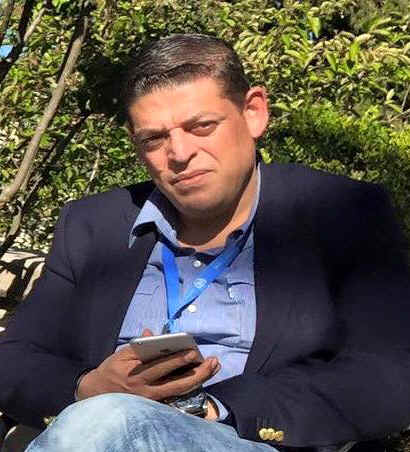
Hard times for GNRD
Is rights group's Emirati funding drying up?
13 February 2016: This time last year the strange organisation known as the Global Network for Rights and Development was preparing to host a lavish two-day conference at one of Switzerland's top hotels. Some 200 delegates flew in from 67 countries to hear GNRD's founder-president, Loai Deeb, announce a ludicrously unworkable plan for an "international convention" against terrorism. At least one of those taking part, a British MEP, was provided with a business class ticket to attend.
At the time, money seemed to be the least of GNRD's worries. Established in 2008 and based in Norway, it had expanded rapidly, opening branch offices in Belgium, Switzerland, Spain, Sudan, Jordan and the United Arab Emirates, with plans for others in Britain and the United States. It was also beginning to acquire some influence: it had recently been granted consultative status at the United Nations and was registered for lobbying purposes at the European Parliament in Brussels.
But suddenly, GNRD's ample funding turned into its biggest problem. Almost all its money had been coming from sources in the UAE, where Deeb also has business interests. For reasons which have yet to be explained, these transfers from the UAE triggered an alarm in the international banking system and last May Norwegian police raided GNRD's Stavanger headquarters, along with Deeb's, home, on suspicion of money-laundering. This was followed by further raids at GNRD and the home of two other employees in October. GNRD and Deeb deny money-laundering and claim the raids were instigated by the government of Qatar. The police investigation continues.
This was not Deeb's first run-in with the Norwegian authorities. His home had previously been the headquarters of a fake university which was closed down under the threat of legal action by Norway's education ministry. (For more background on Deeb and GNRD, see my compilation of previous blog posts.)
Earlier this week, Deeb, who is of Palestinian origin, posted a glum-looking photo of himself on Facebook with the words: "When life change to be Harder .. Change yourself to be stronger".
Since the police raids, GNRD has continued to function but there are indications that its Emirati funds may be drying up. One sign that it is actively looking for finance from elsewhere is its application for a 28,000-euro grant from the Spanish MAPFRE Foundation.
GNRD also seems to be scaling-back its day-to-day activities. One indicator is its Twitter feed, which contains only 11 new posts so far this year, compared with more than 60 in the same period last year. It's a similar picture on GNRD's own website, with just 10 new items posted so far this year, compared with 28 in the same period last year.
Actual activities this year, as reported on the website, seem rather low-key too. The Brussels branch has been collecting clothes to send to displaced Syrians; GNRD Spain organised a panel discussion on Palestine and concluded a series of workshops on personal development for the unemployed. The Spanish branch also has several ongoing projects in Latin America, however.
One potential brighter spot on the horizon is that GNRD Spain has secured EU backing (and presumably EU funding) for a project to combat bullying among young people, which is due to start next month. An announcement on its website says:
"The GNRD Spain office in Valencia recently had a six-month Erasmus+ project, accepted by the European Union, in which they engaged five other international organisations to combat bullying in all its forms.
"The Associatia Support for Youth Development (Romania), IFALL (Sweden), WalkTogether (Bulgaria), Associazione Futuro Digitale (Italy), and Seiklejate Vennaskond (Estonia), will collaborate with GNRD in the organisation of different interactive workshops and role-playing games in order to raise awareness amongst a selected group of European youth leaders about bullying and its consequences. The project, which is called ‘What can I do? Stop bullying, take action,’ will start in March 2016."
If GNRD succeeds in getting the 28,000-euro MAPFRE grant the money will be allocated to another anti-bullying project, this time in Ecuador.
Meanwhile, there seem to be problems at GNRD's office in Jordan. Towards the end of last year the office was looking for interns, and in November and December a group of students from the University of Jordan were put through what seemed to be a rigorous selection process.
One young woman, who says she was told she had passed, made plans to take up an internship at the Amman office in mid-January. Since then she has been struggling to re-establish contact. She says her emails have been ignored, she has been unable to get through on the phone and when she visited the office she found it closed.
The most recent accounts from GNRD's Jordanian branch, for the year to 30 September 2014, show that it started the year with assets of JD 201,000 (about $281,000), including a very healthy bank balance of JD 160,000. However, with spending during the year of JD 140,000 and income of only JD 4,000, these assets had dwindled by the end of the year to JD 65,000.
But the most striking feature of these accounts is that more than 80% of GNRD's Jordanian expenditure went on running costs (including JD 83,000 on salaries and JD 12,000 on rent). Spending on specific projects amounted to little more than JD 25,000, of which by far the largest amount – JD 18,000 – went on aid to the Zaatari refugee camp.
The continuing decline of GNRD
EU Parliament's accreditation expires
16 April 2016: The decline of GNRD, the strange NGO-type organisation linked to the United Arab Emirates, continued this week when its accreditation at the European Parliament expired.
In its heyday, GNRD had 15 people registered for lobbying purposes in Brussels, with permits granting them access to the EU parliament's premises. Last year the number declined to six, then two, and on Thursday the two remaining accreditations – issued to Omar al-Manssi and Abu Daka Ala – lapsed. GNRD's record in the EU transparency register now states that it has no one accredited to the parliament.
GNRD still has "consultative status" at the United Nations, which it obtained last year in controversial circumstances with backing from Azerbaijan, Burundi, China, Cuba, Guinea, India, Iran, Mauritania, Nicaragua, Pakistan, Russia, South Africa, Sudan, Uruguay and Venezuela.
For more about GNRD's colourful past, see this complilation of previous blog posts.
Meanwhile, there is no sign of GNRD's long-promised final report on last year's parliamentary election in Egypt. In November, GNRD announced that it would be publishing "a comprehensive final report with plausible recommendations".
"GNRD and its partners are confident that the report and its recommendations will be a vital contribution to this epoch-making democratic process in Egypt," it said.
In 2014 GNRD – the Global Network for Rights and Developmetn – sent observers to the presidential election which legitimised Sisi's seizure of power in Egypt. This was followed by an enthusiastic report about the election's "transparency, integrity, and success", praising Egypt's "achievements thus far towards a path to democracy".
Shortly afterwards GNRD was chosen by the Sisi regime as one of only five international organisations permitted to observe the parliamentary elections which were eventually held beween October and December last year.
Since February 29, GNRD has posted nothing in its previously-active Twitter feed which has more than 900,000 (mostly fake) followers. The organisation's founder-president, Loai Deeb – who previously ran a fake university in Norway and claims to have a doctorate in international law – continues posting to 1,471,000 (again, mostly fake) followers in his personal Twitter feed, though he seems to have dropped the earlier practice of paying for thousands of retweets.
This time last year, GNRD appeared to be an active and well-funded organisation. Based in Norway, it had offices in Belgium, Switzerland, Spain, Sudan, Jordan and the UAE, with plans for more. In February last year it organised an international conference at one of Switzerland's top hotels where Deeb unveiled a bizarre plan for countering terrorism.
The downturn began in May when Norwegian police raided GNRD's Stavanger headquarters, along with Deeb's, home, on suspicion of money-laundering. This was followed by further raids at GNRD and the home of two other employees in October.
At the time, almost all GNRD's funding had reportedly been coming from sources in the UAE, where Deeb also has business interests. GNRD and Deeb deny money-laundering and claim the raids were instigated by the government of Qatar.
Økokrim, Norway's economic crimes unit, has not responded to an email sent early this week enquiring about the status of the money-laundering investigation.
'Rights group' GNRD goes bust
5 July 2016: One of the world's strangest human rights organisations, the Emirati-funded Global Network for Rights and Development (GNRD), was declared bankrupt by a court in Norway yesterday.
The case was brought by an employee, Thomas Bechmann, who claimed he was owed NOK 250,000 ($30,120) in unpaid wages since January. "We were told all the time that the money came next week, then next week, then next week," the Norwegian news agency NTB quoted him as saying. Bechmann had been working at GNRD's Stavanger headquarters as a film producer and project manager since October 2014.
GNRD was once well-funded. In 2014 it had 67 staff and a declared annual budget of €4.2 million. Founded in 2008, it expanded rapidly from its Norwegian base, establishing branches in Belgium, Switzerland, Spain, Sudan, Jordan and the UAE.
It has consultative status at the United Nations and is recognised by the EU and registered for lobbying purposes at the European Parliament in Brussels. It also has a cooperation agreement with the African Union and has acted as an official observer for elections in several Arab and African countries.
Despite this international recognition, GNRD always had questionable credentials. Palestinian-born Loai Deeb, its founder/president, had previously run a fake university from his home in Stavanger.
The "Scandinavian University", as Deeb called it, boasted of having 175 professors and more than 300 lecturers, plus a wide range of courses stretching from engineering and economics to sharia and Islamic Studies. How many students it had is a complete mystery and documents filed with the authorities showed that despite the claims of a large teaching staff it had no employees at all. Deeb's "university" eventually closed after being threatened with legal action by the Norwegian education ministry.
At GNRD, Deeb insisted on being referred to as "Doctor Deeb" – claiming to have a PhD in international law. Norwegian media have been unable to establish where he got this degree and Deeb himself has given no clear explanation.

Deeb and GNRD also resorted to subterfuge on social media by apparently purchasing vast numbers of supporters and followers. Deeb currently has an unbelievable 1.46 million followers on Twitter and GNRD has almost 900,000. Deeb's Facebook page has 1.2 million "likes" and GNRD's has 1.1 million. In addition, before money became scarce, they were paying to have their posts on Twitter retweeted thousands of times by fake accounts.
The bubble burst suddenly in May last year when Økokrim (Norway's economic crime police) raided Deeb's home and the offices of GNRD. They were accused of money-laundering and benefiting from the proceeds of crime – to the tune of $13 million, according to Norwegian media reports. The case has yet to be heard in court. In April Økokrim confirmed that its investigation is continuing but declined to comment further.
Deeb and GNRD deny wrongdoing and claim the case was instigated by the government of Qatar. The Norwegians say it began when large transfers of money from the UAE triggered an alert in the banking system.
Last October, Innsamlingskontrollen, the Norwegian body that monitors charitable fundraising warned against donating money to GNRD. It placed GNRD on a Watch List, saying it had "completely failed to respond to repeated requests" for key information about its finances and organisation.
First suspicions
I first became suspicious of GNRD in September 2014 because – unlike most human rights organisations – it had an unusually favourable view of human rights in the UAE. This led to a lengthy investigation of its activities which I documented in a series of blog posts (see compilation here).
In February last year, GNRD held a lavish two-day conference at one of Switzerland's top hotels. Some 200 delegates flew in from 67 countries to hear Deeb announce a ludicrously unworkable plan for an "international convention" against terrorism. At least one of those taking part, a British MEP, was provided with a business class ticket to attend. A video of Deeb's speech to the conference has purportedly been viewed 1,186,613 times.
My criticism of the Geneva conference seems to have struck a particularly raw nerve and, in a statement on its website, GNRD announced that it was "in the process of opening a legal case" against me. I never heard anything from lawyers but a campaign of online harassment began.
Someone created a fake Facebook profile using my name and photograph with a misleading CV. My own Facebook account was briefly suspended after someone complained that I was using a false name, and someone tried to hack into my Twitter account.
A Twitter account called @Media_intel also began making false claims about me. One of its tweets said I was being paid $50,000 a year by Qatar; another said I had been expelled from Yemen for a sexual offence. These claims were then retweeted thousands of times by fake Twitter accounts – the same fake accounts that Deeb and GNRD were using to promote their activities.
Running out of money
The first signs that GNRD was running short of funds came at the start of this year. The number of activities reported on its website shrank dramatically. Its posts on Twitter also dropped to a fraction of what they had been a year earlier, often appearing without the large numbers of paid-for retweets.
In Jordan, a young woman who in December had been offered an internship at GNRD's Amman office found the office closed when she tried to take up the post in January.
In April, the accreditation of GNRD's two remaining lobbyists at the European Parliament in Brussels lapsed. At its peak, the organisation had 15 people registered there for lobbying purposes. Meanwhile, officials of the EU's Transparency Register are looking into GNRD's use of the European Parliament logo on its website and its claim that the parliament is one of GNRD's "collaborators". The rules say that registered organisations must "not claim any formal relationship with the European Union or any of its institutions ... or use the logos of EU institutions without express authorisation."
GNRD's last major project was observing the Egyptian parliamentary elections which ended in December. It had been chosen to lead an international observer mission after issuing a favourable report on the earlier presidential election which legitimised Sisi's seizure of power. Although GNRD completed its observation of the parliamentary elections, a long-promised final report on Egypt's "epoch-making democratic process" has still not appeared.
Bankrupt rights group GNRD and the European parliament


23 July 2016: For several years GNRD, the now-bankrupt human rights organisation, boasted that the European Parliament was one of its international "collaborators" and proudly displayed the parliament's logo on its website. The effect of this was to give the UAE-funded organisation an aura of credibility that it didn't deserve.
The basis for claiming the European Parliament as a "collaborator" was that GNRD (the Global Network for Rights and Development) had registered itself with the EU in Brussels as a lobbying organisation.
However, this infringed the EU's rules for registered lobbying organisations which clearly state that they must ...
... not claim any formal relationship with the European Union or any of its institutions in their dealings with third parties, or misrepresent the effect of registration in such a way as to mislead third parties or officials or other staff of the European Union, or use the logos of EU institutions without express authorisation
In June, officials of the EU Transparency Register contacted GNRD about its use of the parliament's logo. According to the officials, GNRD admitted to "having inadvertently used the European Parliament’s logo without the intention of suggesting a formal link with the European Parliament."
GNRD removed the logo from the "Our collaborators" page on its website, though it was left untouched on another page headed "Support us".
Last year GNRD won official recognition from the United Nations when ECOSOC (the UN Economic and Social Council) voted to grant it special consultative status. GNRD was supported in this move by such notable human rights torch-bearers as Russia, China, Cuba, Iran, Azerbaijan, Mauritania and Sudan. Consultative status gave it access to the UN headquarters in Geneva and allowed it to book rooms for meetings at the Palais des Nations.
GNRD – based in Norway – continued using these UN facilities even after its offices had been raided by Norwegian police on suspicion of money-laundering. In June last year it used a session of the UN Human Right Council as a platform to denounce the Norwegian action as an abuse of its rights. It denies the money-laundering charges and claims they were instigated by the government of Qatar.
It might be assumed that GNRD's bankruptcy would mean automatic loss of its UN consultative status. But so far, that hasn't happened. It is still listed in ECOSOC's register.
On July 4, GNRD was declared bankrupt by a Norwegian court for non-payment of employees' wages. While it's possible that branches in other countries – the UAE, Belgium, Jordan and Spain – still hold some funds, there has been no sign of recent activity from any of them.

 RSS Feed
RSS Feed
